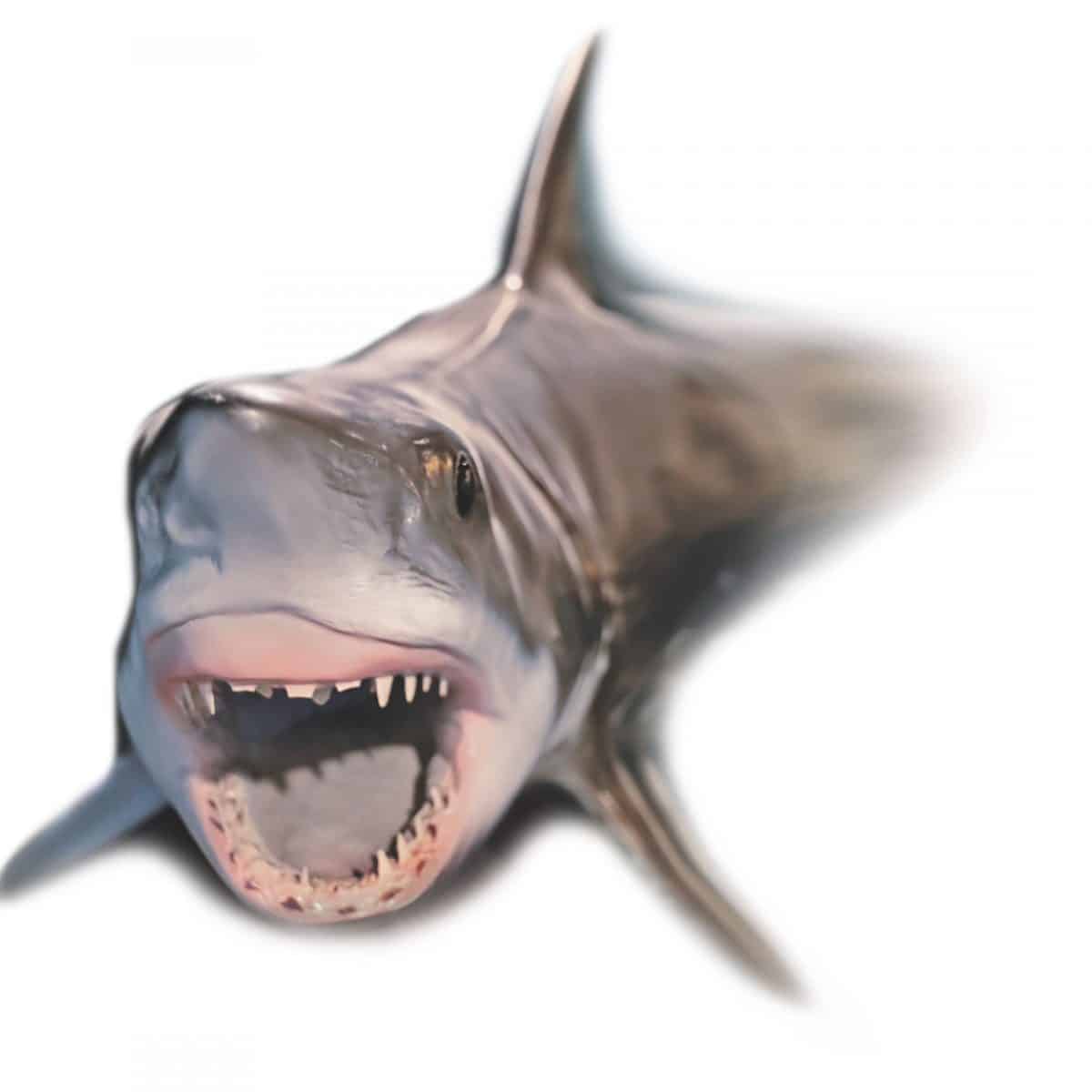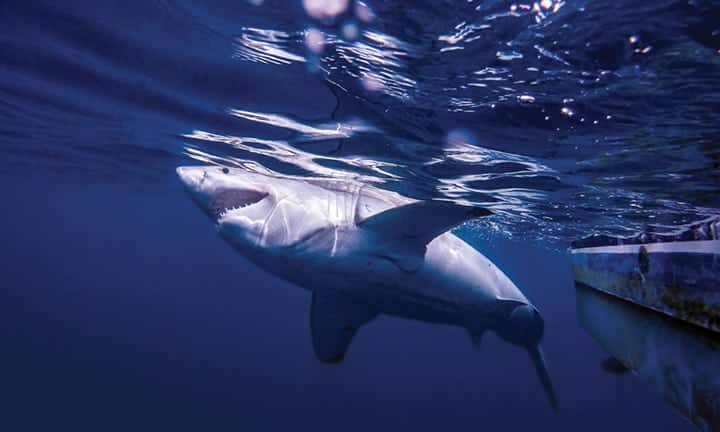by Steve Desroches
There’s a world map in the Atlantic White Shark Conservancy’s new Shark Center in Provincetown that features a color-coded patchwork to illustrate where great white sharks migrate to and then, in turn, congregate. The “hot spots” for great whites are marked with gold and signify that these magnificent animals are most commonly found off Mexico’s Guadalupe Island, South Africa, western Japan, southern Australia and New Zealand, and Lower and Outer Cape Cod. These apex predators primarily cruise the coast from Chatham up to Provincetown hunting various species of seals. Some were almost hunted into extinction, but thanks to federal and state protections have recovered, thus drawing the great whites back into our waters after a long absence. Their arrival is evidence of a healthy ecosystem. It’s good news.
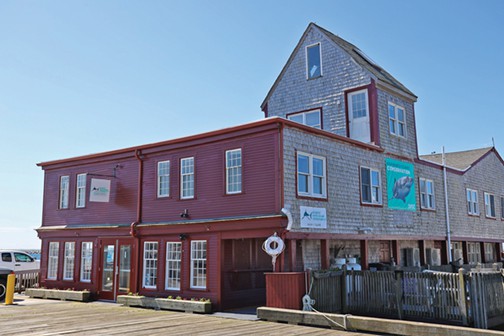
The repopulation of great white sharks in this part of the North Atlantic began in earnest about 10 years ago, providing incredible opportunities to learn more about these animals while also presenting a challenge as to how we as humans can best adapt to keep ourselves safe as well as the sharks, which are also protected by both state and federal laws. That’s why in 2012 Cynthia Wingren founded the Atlantic White Shark Conservancy with the mission of research, education, and public safety. Based in Chatham, the Conservancy conducts its own research exhibitions as well as collaborates with universities and other organizations like the Woods Hole Oceanographic Institution, the Commonwealth of Massachusetts, and the Center for Coastal Studies here in Provincetown. And in the fulfillment of education and public safety, part of the effort includes operating a year-round Shark Center in Chatham and the new Shark Center Provincetown located at the end of MacMillan Pier, open now through October. In its opening this past Memorial Day weekend the center welcomed 250 visitors, says Shark Center Provincetown manager Abby Geisen. Visitors of all ages enthusiastically toured the new center’s impressive and well-designed exhibition, with several interactive displays meant to educate as well as counter the mythical narrative of great white sharks often generated by Hollywood and general misinformation. Visitors asked lots of questions, but the most common one was in regards to swimming off of Cape Cod.
“That’s the most common question we get,” says Geisen. “How far should I go out?”
Recent data recorded by the Conservancy can provide some guidance as research conducted by staff scientist Megan Winton shows that great whites spend about 50 percent of their time here about 15 feet from the shore. The Conservancy provides information and data, but any decisions regarding beach protocols or closures is at the discretion of each town or the Cape Cod National Seashore, depending on which beach you visit. Signs alerting beachgoers that great whites frequent our waters, as well as the ubiquitous purple flag with a white outline of a shark, are now Cape Cod icons. But it’s efforts like the Shark Center Provincetown that seek to alleviate the myths and mysteries around great whites, and other species of sharks, too.
Laid out in a narrative format, Shark Center Provincetown features interpretive exhibits of the research being conducted and the data revealed. It is roughly estimated that there are 300 great whites that convene here, largely from spring through late fall, and photographs of tagged and named sharks greet visitors. Detailed mapping shows where these sharks migrate when they leave Cape Cod waters and the routes they take when they return. Sharks like Turbo, Marianne, and SPC Brian Arsenault (named after a Massachusetts paratrooper who was killed in Afghanistan in 2014) swim thousands of miles up and down the East Coast of the United States in a remarkable migration.
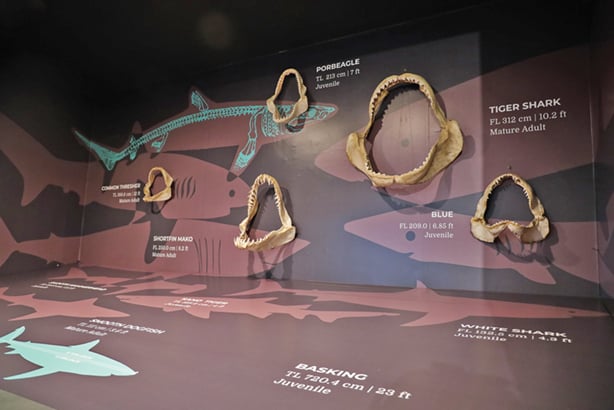
Interesting and informative for people of all ages, the center also has a kinetic sand installation that allows people to form their own ocean floor topography while a projection of seal and shark outlines responds in kind, showing how sharks hunt and how seals try to evade these agile predators. A 12-foot model of a female great white named Drogin also features a touchscreen that provides specific information on the real-life shark depicted. There’s a wall of shark jaws of a variety of species, on loan from the National Oceanic and Atmospheric Administration. And perhaps the most popular feature is the replica of a shark cage surrounded on three sides by screens that give the illusion of being underwater as large shadows swim by and the voice of marine scientists talk about working in that environment, while visitors get to experience it, but stay quite dry. Throughout the entire experience the story told is firmly rooted in the Outer and Lower Cape, as sharks behave differently as they travel the globe. Ongoing research on the water and, in particular, at Head of the Meadow Beach in Truro and Nauset Beach in Orleans presents Cape Codders and visitors with solid information on how we can all enjoy our gorgeous beaches safely and also be good stewards of our environment to ensure a healthy balance is maintained in the ecosystem, reducing encounters between sharks and humans, particularly since in the past 10 years three people have been bitten by great whites in our waters, one being fatal, the first in Massachusetts since 1936.
“The way recreation has changed so much over the past century has changed our relationship to sharks,” says Geisen. “It’s changed the way we interact with sharks because we spend more time in the water.”
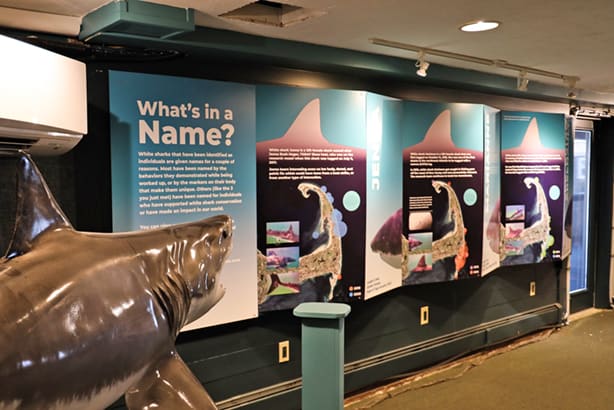
The center feels at home on MacMillan Pier as Provincetown was the first place on the East Coast to develop a whale watching industry to help preserve those great mammals. And now the town is part of this conservation effort. Fears that the return of great white sharks would hurt the region’s tourism economy have not come to fruition as visitors share an enthusiasm and curiosity about sharks providing a new opportunity for Cape Cod’s ecotourism industry. And those that visited the Center over the holiday weekend got to see just how much scientists have learned over the past decade, but also how much more work there is to do as much about the behavior and life span of a great white remains unknown to science.
“There’s still a lot to learn about white sharks,” says Geisen. “A lot.”
The Atlantic White Shark Conservancy’s Shark Center Provincetown, 16 MacMillan Pier, is open 10 a.m. to 4 p.m. (last admission 3 p.m.) Thursday through Sunday until June 19. From June 23 to September 4 the center is open seven days a week, and come September 8 through October 9 it returns to Thursday through Sunday. Admission is $12 for adults and children over 5, $10 for active military and veterans, and kids under 5 are free. For more information visit atlanticwhiteshark.org or call 508.348.5901.
